七年级下英语unit12学生学案
新七年级下Unit12学案

英) 15712 Unit12 What did you do last weekend? Period1主备:王鹏鹂同备:七年级英语备课组审核:陈桂杰备课时间:2013.5【学习目标】1. 通过预习, 能说出和简单运用表示周末活动的动词短语.2. 会写出规则动词和不规则动词的过去式.3. 学会用What did you do last weekend? I......... 来询问和回答周末活动.【自主预习】:1.预习课本P67-68, 写出下列动词短语。
(动词短语用过去式)做家庭作业_____________ 去看电影________________ 去划船______________去湖边露营______________ 去沙滩__________________ 打羽毛球_____________看望我的祖母______________为英语考试做准备______________ 喂了一些奶牛___________2.通过预习, 根据提示词, 连词成句.(1)Sunday, did, I, on, homework, morning, my ____________________________________.(2)A: did,weekend, what, do,last,you. ____________________________________________?B: Saturday, camped, lake,by,I,on,the,morning ___________________________________.【团队合作探究】1. 动词过去式知多少?(小组合作探究学习:请观察给出的动词,你能写出其它动词的过去式吗?)1) want - wanted 2)live--lived 3) study – studied 4)stop—stoppedclean – cleaned dance – danced play – played plan______turn ______ taste _______ stay _______happen ______ waste _______ cry ________wish _________ agree _______ marry _______你知道下列动词的过去式吗?do ______ go ______ have _____ is_____ see_____sit______ read______ feed_____ am______ are_____提示:A: What did you do last weekend, Becky?B: I …...A: What abo ut your friend, …?B: She / He …... What did you do?A: I …...【达标检测】: 一.写出下列动词的过去式1.do2.play3.clean4.visit5.study6.practice7.have 8.stay 9.read 10.watch 11.cook 12.die13.get 14.sit 15.look 16. go 17. eat 18. stop二.单选( ) 1. I ____ my homework yesterday. A don’t do B didn’t do C didn’t D don’t( ) 2. We played badminton _____ Sunday morning. A on B in C for D at( ) 3. A: ___ did you do last weekend? B: I visited my grandparents.A HowB WhatC WhereD Who( ) 4. A: Who went camping? B: Becky____. A go B went C did D do( ) 5. ---What did you do last weekend? ---__________________.A I have a good trip.B I read a book about science.C I was very tiredD I liked it very much.【延伸迁移】调查: 写出小组内你想采访同学的姓名,并猜测他们的周末是怎么过的, 然后去采访那英) 15712 Unit12 What did you do last weekend? Period2主备:王鹏鹂同备:七年级英语组审核:陈桂杰备课时间:2013.5【学习目标】1.通过自主预习, 识记一些重点短语并能理解课文大意完成首字母填空.2.能用带有who,where,what等特殊疑问句的一般过去时询问信息并能做出正确的回答.3. 通过表演故事, 会使用规则动词和不规则动词的过去式.【自主预习】1. 预习课本P 68,69,72 , 写出下列短语很多游客_______ 有点疲劳______ 多么有趣啊__________ 告诉某人关于某事__________熬夜很晚___________ 生活习惯__________ 在自然历史博物馆________________________听起来很有趣_____________丢东西__________ 老鼠一家_____________快速跑开__________爬到她父亲的后背上______________________大声叫嚷______________挤牛奶______________学习第二语言很重要___________________________ 它有点困哪_________________________帮助我妈妈做饭__________________看一个有趣的谈话节目_____________________________2.通过预习,根据P68 2d及首字母填空.Lisa’s weekend was r_____ great. She worked as a g______at the N______ History Museum. How i________! There’s a butterfly house with o___ 200 kinds of b_________in it. She told the v_____ about their l______ habits. But she ‘s kind of t_____because she s_____up late to watch the soccer game last night.【团队合作探究】:1.听2d 对话,在听的过程中理解下面问题,并记录下来.(1)How was Lisa’s weekend? ___________________________________________ .(2)What did she do? __________________________________________________.(3)How many kinds of butterflies do they have?_____________________________.(4)What did Lisa tell the visitor? _________________________________________.2.观察Grammar focus表格, 小组讨论并思考以下问题:(1)这些特殊疑问词分别表示什么意思?___________________________________(2)这些问句的过去时态一般借助那个助动词?________. 句中的实义动词要用什么形式?________(3)观察:第2句Who visited her grandma? 第4句:Who did she go with? 为什么一个需要助动词,一个不需要?___________________________________________________________________.归纳: 在过去时态的特殊疑问句中,一般需要借助助动词______,而句中的实义动词用_______. 但Who 问句需要区别对待:当who 在句中做主语时,________(需要,不需要)借助助动词did,直接用实义动词的_______.如:谁拜访她祖母呢?,试翻译:________________________; 当who在句中做______时, 则和其他问句一样,要借助助动词_____.3 根据3b,让学生小组讨论,先读故事填词, 注意规则和不规则动词过去式的用法.然后小组内分角色表演故事, 一个当narrator(叙述者),一个扮演Father Mouse,一个扮演Baby Mouse, 一个扮演猫. 注意语气变化.【达标检测】一. 单选( )1. She showed the visitors around _____ a guide. A as B with C for( )2 ---______ your school day? --- It was great! A How is B What was C How was( )3 I ______ English yesterday evening. A. study B. studied C. studyed( ) 4. Last week, seven kids ______ a movie. A. saw B. watch C. looked D. read( )5. --Where ____ you yesterday? -- I stayed ______ home, reading books.A were atB was atC were in【延伸迁移】结合课本p72 3a, 小组活动,学生轮流介绍自己上周末的活动,并用概念图或者图画的形式展示出来, 并进行汇报.Report:Last weekend I was busy. I._____________________________________________________________ _______________________________________________________________________________________ _______________________________________________________________________________________ ______________________________________________________________________________________英) 15712 Unit12 What did you do last weekend? Period3主备:王鹏鹂同备:七年级英语组审核:陈桂杰备课时间:2013.5【学习目标】1. 通过自主预习, 识记一些重点短语及用法2. 通过阅读,让学生学会阅读,从单词短语再到语篇结构上去理解文章.3. 通过时间顺序能画出概念图,并复述课文.【自主预习】1. 预习课本P70-71, 写出下列短语唱歌和弹吉他_________________ 为考试做准备________________跟朋友吃晚餐________________去图书馆________________ 放风筝_______________ 在游泳池游泳__________________一个令人难忘的周末_____________________ 有趣但吓人___________去露营______________乘长途汽车去湖边_____________________搭帐篷_____________生火___________取暖___________ 煮食物___________ 大吃一惊_______________ 从帐篷里往外看___________弄醒蛇_____________ 开始跳上跳下__________________ 爬进森林_____________有用的教训_________________【团队合作探究】:1.头脑风暴, 小组讨论, 说出大家一般都害怕的动物并说出原因.___________________________________________________________________________2.Reading skills. 小组讨论,分别通过阅读技巧完成以下任务.(1)Fast reading: 快速阅读,完成2b 中1,2,6 题(2)Careful reading 阅读细节,完成2b中3,4,5.(3) 注重语篇阅读,完成2c.3.小组合作,.一名学生扮演记者, 其他三名学生分别扮演Lisa, Lisa’s father and her sister, 记者采访这三位, 编成对话._______________________________________________________________________________________ _______________________________________________________________________________________ ______________________________________________________________________________________ 4.在2c基础上,让学生根据先后顺序画出lisa的周末,根据概念图复述课文._______________________________________________________________________________________ _______________________________________________________________________________________ _______________________________________________________________________________________ 【达标检测】用所给动词的适当形式填空。
人教版七年级英语 下册Unit 12 What did you do last weekend学案
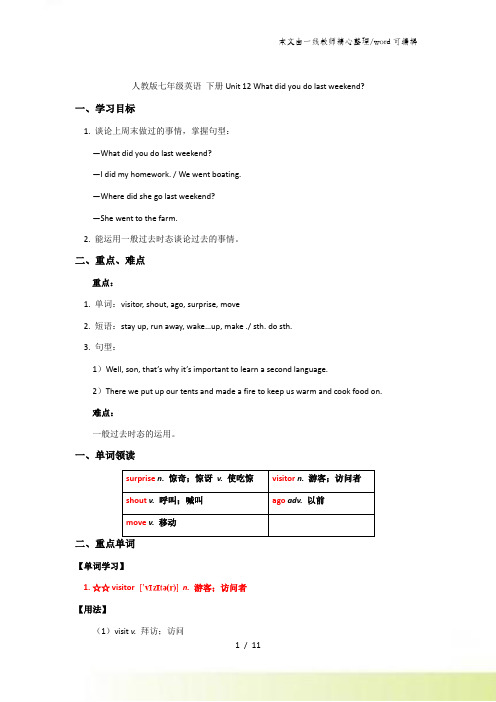
人教版七年级英语下册Unit 12 What did you do last weekend?一、学习目标1. 谈论上周末做过的事情,掌握句型:—What did you do last weekend?—I did my homework. / We went boating.—Where did she go last weekend?—She went to the farm.2. 能运用一般过去时态谈论过去的事情。
二、重点、难点重点:1. 单词:visitor, shout, ago, surprise, move2. 短语:stay up, run away, wake…up, make ./ sth. do sth.3. 句型:1)Well, son, that’s why it’s important to learn a second language.2)There we put up our tents and made a fire to keep us warm and cook food on.难点:一般过去时态的运用。
一、单词领读surprise n.惊奇;惊讶v. 使吃惊visitor n.游客;访问者shout v. 呼叫;喊叫ago adv.以前move v.移动二、重点单词【单词学习】1. ☆☆ visitor n.游客;访问者【用法】(1)visit v.拜访;访问(2)visit v.参观;游览(3)visit n.拜访;参观【例句】There are many visitors visiting the mountain. 有许多游客游览这山脉。
I visited my friends last weekend. 我上周末看望了我的朋友。
Now we’re on a visit to Guilin. 现在我们正在桂林参观。
【考题链接】He often __________ his father in the country during the vacation.A. visitB. visitsC. visitorD. visited答案:B思路分析:根据题干中的often可知用一般现在时;D项表示一般过去时态,排除;C 项意为“游客”,是名词,排除;再根据主语he是第三人称单数,故谓语动词用第三人称单数形式,排除A项。
人教版七年级英语下册unit12优秀教案
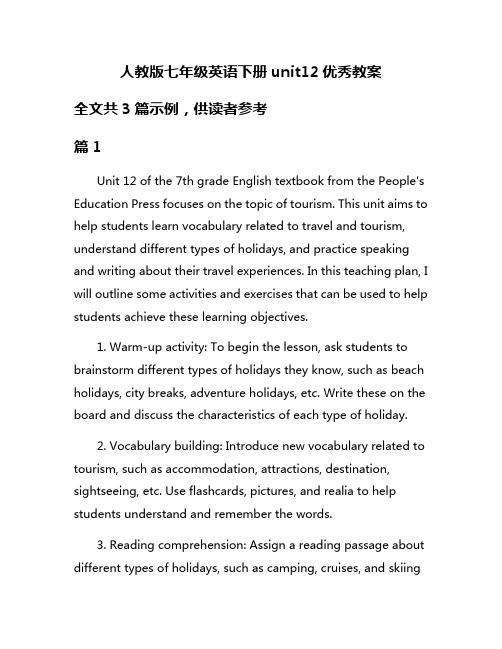
人教版七年级英语下册unit12优秀教案全文共3篇示例,供读者参考篇1Unit 12 of the 7th grade English textbook from the People's Education Press focuses on the topic of tourism. This unit aims to help students learn vocabulary related to travel and tourism, understand different types of holidays, and practice speaking and writing about their travel experiences. In this teaching plan, I will outline some activities and exercises that can be used to help students achieve these learning objectives.1. Warm-up activity: To begin the lesson, ask students to brainstorm different types of holidays they know, such as beach holidays, city breaks, adventure holidays, etc. Write these on the board and discuss the characteristics of each type of holiday.2. Vocabulary building: Introduce new vocabulary related to tourism, such as accommodation, attractions, destination, sightseeing, etc. Use flashcards, pictures, and realia to help students understand and remember the words.3. Reading comprehension: Assign a reading passage about different types of holidays, such as camping, cruises, and skiingtrips. Have students read the passage individually and then discuss it in small groups. Ask comprehension questions to check their understanding.4. Speaking activity: Divide students into pairs or small groups and have them discuss their dream holiday. Encourage them to use the new vocabulary they've learned in their conversation. Afterward, have a few students share their ideas with the class.5. Writing activity: Ask students to write a short paragraph describing a recent trip they took or a holiday they would like to go on in the future. Encourage them to use descriptive language and include details about the activities, accommodation, and sights they would like to see.6. Role-play: Divide students into groups and assign them different roles, such as travel agent, tourist, hotel receptionist, etc. Have them role-play a dialogue in which the tourist asks for information about a hotel or tourist attractions. This will help students practice using the new vocabulary in context.7. Vocabulary review: Play a game such as Pictionary or charades to review the new vocabulary from the unit. Divide the class into teams and have one student from each team draw or act out a word while their teammates guess what it is.8. Assessment: To assess students' understanding of the unit, give them a quiz with questions about the new vocabulary, reading passage, and speaking/writing activities. This will help you gauge their progress and identify any areas that need further review.Overall, this teaching plan is designed to engage students and help them develop their English language skills in the context of travel and tourism. By incorporating a variety of activities and exercises, students will have the opportunity to practice speaking, listening, reading, and writing in English while learning about different types of holidays and destinations.篇2Unit 12 of the People's Education Edition Grade 7 English textbook is an important unit that focuses on the topic of sports and health. In this unit, students will learn about different sports, how to talk about their favorite sports, and how to discuss the benefits of exercise. Here is an excellent lesson plan for Unit 12:Title: Sports and HealthObjective: By the end of the lesson, students will be able to talk about different sports, describe their favorite sports, and discuss the benefits of exercise.Time: 90 minutesMaterials: Unit 12 textbook, whiteboard, markers, pictures of different sports, handouts with exercises1. Warm-up (15 minutes)- Start the lesson by asking students about their favorite sports. Have a short discussion about the sports they like to play or watch.- Show pictures of different sports and ask students to identify them. Write the names of the sports on the board.2. Vocabulary (20 minutes)- Introduce new vocabulary related to sports and exercise such as "jogging", "cycling", "swimming", "volleyball", "basketball", "soccer", "tennis", "table tennis", and "badminton".- Practice pronunciation of the new vocabulary with the students.- Have students do a matching exercise to match the sports vocabulary with pictures.3. Reading and Comprehension (25 minutes)- Have students read the text about different sports in the textbook.- Discuss the main ideas of the text with the students and ask comprehension questions to check their understanding.- Have students work in pairs to discuss which sports they would like to try and why.4. Speaking Activity (20 minutes)- Divide the class into groups and give each group a set of discussion questions related to sports and health.- Have students discuss the questions in their groups and share their answers with the class.- Encourage students to use the new vocabulary they have learned in their discussions.5. Writing Activity (10 minutes)- Have students write a short paragraph about their favorite sport. They should include information such as why they like the sport, how often they play it, and the benefits of playing the sport.- Collect the paragraphs and review them for accuracy and content.6. Wrap-up (5 minutes)- Review the main points of the lesson with the class and ask students to share one thing they learned about sports and health.- Assign homework to reinforce the lesson, such as writing a diary entry about a day of exercise or researching the benefits of a specific sport.This lesson plan for Unit 12 of the People's Education Edition Grade 7 English textbook is designed to engage students in learning about sports and health. By incorporating various activities such as reading, speaking, and writing, students will have the opportunity to practice their English skills while learning about an important topic.篇3Unit 12: At the weekendLesson 1: What do you usually do at the weekend?Objectives:1. Students will be able to talk about their weekend activities using the target language.2. Students will be able to ask and answer questions about their weekend activities.3. Students will be able to use adverbs of frequency correctly in sentences.Key vocabulary:- usually- often- sometimes- rarely- neverWarm-up:- Begin the lesson by asking students to share what they did last weekend. Encourage them to use the target vocabulary in their responses.- Play a quick game of charades where students have to act out different weekend activities (e.g. swimming, shopping) while their classmates guess the activity.Presentation:1. Introduce the target vocabulary words and explain their meanings.2. Model a conversation with a student about weekend activities, using the target language.3. Practice pronunciation of the target vocabulary and review adverbs of frequency.Practice:1. Divide the class into pairs and have them role-play conversations about their weekend activities using the target language.2. Provide a list of weekend activities and ask students to write sentences using adverbs of frequency to describe how often they do each activity.3. Ask students to work in small groups to create a weekend schedule for a fictional character, using the target vocabulary.Production:1. Have students create a short presentation about their weekend activities, using the target language and adverbs of frequency.2. Encourage students to share their presentations with the class and ask questions about each other's weekend routines.Homework:- Assign students to write a diary entry about their upcoming weekend activities, using the target vocabulary and adverbs of frequency.Assessment:- Monitor student participation during pair work and group activities to assess their ability to use the target language accurately.- Review students' homework assignments to evaluate their understanding of the lesson objectives.Overall, this lesson plan aims to engage students in discussions about weekend activities and help them practice using adverbs of frequency to describe their routines. By providing opportunities for speaking, writing, and listening practice, students will have the chance to improve their English communication skills in a fun and interactive way.。
Unit12导学案人教版七年级英语下册
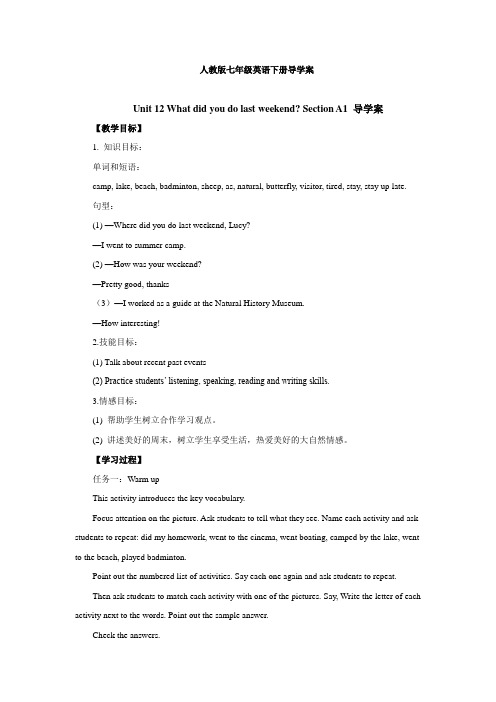
人教版七年级英语下册导学案Unit 12 What did you do last weekend? Section A1 导学案【教学目标】1. 知识目标:单词和短语:camp, lake, beach, badminton, sheep, as, natural, butterfly, visitor, tired, stay, stay up late.句型:(1) —Where did you do last weekend, Lucy?—I went to summer camp.(2) —How was your weekend?—Pretty good, thanks(3)—I worked as a guide at the Natural History Museum.—How interesting!2.技能目标:(1) Talk about recent past events(2) Practice students’ listening, speaking, reading and writing skills.3.情感目标:(1) 帮助学生树立合作学习观点。
(2) 讲述美好的周末,树立学生享受生活,热爱美好的大自然情感。
【学习过程】任务一:Warm upThis activity introduces the key vocabulary.Focus attention on the picture. Ask students to tell what they see. Name each activity and ask students to repeat: did my homework, went to the cinema, went boating, camped by the lake, went to the beach, played badminton.Point out the numbered list of activities. Say each one again and ask students to repeat.Then ask students to match each activity with one of the pictures. Say, Write the letter of each activity next to the words. Point out the sample answer.Check the answers.任务二:ListeningWork on 1bThis activity gives students practice in understanding the target language in spoken conversation.Point to the activities in the picture in activity la. Ask students to tell what the person did in each picture. For example, She played badminton, or Lucy went to the cinema. Play the recording the first time. Students only listen.Play the recording a second time. This time say. Listen to the recording and write the days and times Lucy did each thing under the pictures. Point out the sample answer under the picture of Lucy playing badminton; on Saturday morning.Correct the answers.任务三:Pair workWork on 1cThis activity provides guided oral practice using the target language.Point to the example conversation. Ask two students to read the dialogue to the class.Say, Now work with a partner. Student A, pretend to be Lucy. Student B, ask questions about what Lucy did on different days and times over the weekend. Talk about the activities in the picture.Students work in pairs. As they talk, move around the room monitoring their work. Offer language or pronunciation support as needed任务四:ListeningWork on 2a:This activity gives students practice in understanding the key vocabulary in spoken conversation.Point to the five sentences and ask a student to read these sentences to the class.You will hear recording of a conversation. The people will talk about some of the activities and people, but they will not talk about others. Please underline the words you hear on the recording.Play the recording the first time. Students only listen.Play the recording a second time. This time, ask students to underline each word that is saidon the tape. Point out the sample answer, grandmother.Correct the answers.1grandma 2 homework 3 English 4 farm 5 cows任务五:ListeningWork on 2b:This activity provides listening practice using the target language.Call attention to the pictures of Carol, Becky, and Jack and ask students to identify each person by name.Now I will play the recording again. Listen to the students talking about what they did over the weekend. Write C for Carol, B for B Becky or J for Jack next to each statement in activity 2a. The first one has been done for you.Play the recording the first time. Students only listen.Point out the sample answer, S, in statement 1. Say, Sonia visited her grandmother.Play the recording again. Ask students to write a letter in front of each statement to show what each person did.Check the answers. B B C J J任务六:Pair workAsk and answer in pairs.Point to the example conversation. Ask two students to read the dialogue to the class.Say, Now work with a partner. Student A, ask questions about what, who or where, Student B answers. Students work in pairs.任务七:Roleplay the conversation.1. Ask Ss to look at conversation in 2d. Then Ss read the dialogue by themselves and find the answer to these questions:(1) What did Lisa do on her weekend?(2) What did Paul do on his weekend?2. Ss work in pairs and roleplay the conversations.3. Have several pairs perform their conversations for the rest of the class.Unit 12 What did you do last weekend? Section A2 导学案【教学目标】1. 知识目标:单词和短语:away, mouse, baby, shout, woof, language,run away, shout at, last weekend, go boating, last weekend句型:(1)What did you do last weekend?(2)I did my homework.(3)Who visited her grandma?(4)Where did she go last weekend?(5)She went to a farm.(6)Who did she go with?(7)She went with her classmates.2.技能目标:(1)Talk about recent past events(2)Practice students’ listening, speaking, reading and writing skills.3.情感目标:(1)提高学生独立学习能力。
七年级英语下册UNIT12导学案

七年级英语下册UNIT12导学案新拨中学英语学科导学案主备人:王丽艳张立平编号:课题:Unit12 Don’t eat in class! Section A(1a-2c) ? 【学习目标】1.掌握下列单词:rules,hallway,classroom,fight,Ms,outside,dining,hall,e lse2 .Can make 2conversations withWhat are the rules at your school?Don’t eat in class.3. 学会描述规则和祈使句的用法。
(一)【预习导学(Warming Up) 】1.Read new words by themselves,then check some students’ pronunciationsand.规则走廊教室打架女士外边吃饭大厅别的(二)【合作探究】1.翻译短语上课迟到在走廊里跑在教室吃东西上课吃东西听音乐在音乐教室学校规则戴帽子在外边吃in class 在课堂上 in hospital 生病住院in the class在教室 in the hospital 在医院3. else和other的区别else adj 修饰疑问词或不定代词,位于其后,other adj 修饰名词,置于之前。
Where else can he be?他还会在什么地方?Where are the other boys?其他男孩在哪儿?3.读学校规则并翻译祈使句是用来表示请求、命令、叮嘱、号召或者劝告等的句子,这类句子的主语常是第二人称you,也就是听话者,因而you常省去了。
祈使句的开头是动词原形。
Look out! 小心!Wait here for me! 在这等我!祈使句的否定形式多以do not(常缩写成don't)开头,再加上动词原形。
Don't arrive late for school. 上学别迟到。
2023年人教版七年级英语下册Unit12 学案
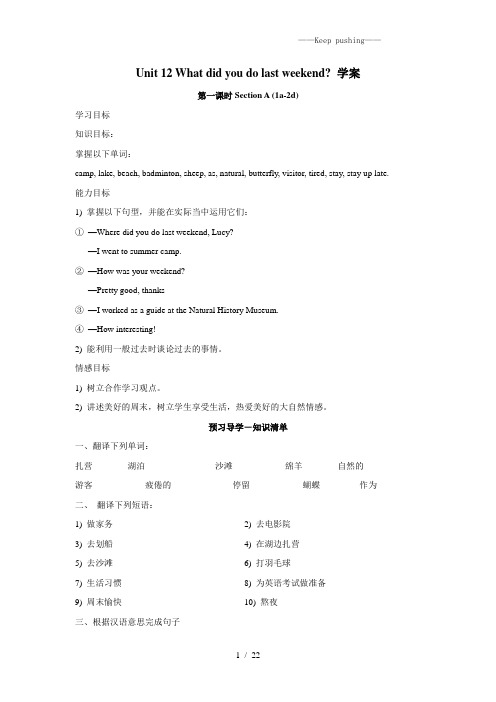
Unit 12 What did you do last weekend? 学案第一课时Section A (1a-2d)学习目标知识目标:掌握以下单词:camp, lake, beach, badminton, sheep, as, natural, butterfly, visitor, tired, stay, stay up late.能力目标1) 掌握以下句型,并能在实际当中运用它们:①—Where did you do last weekend, Lucy?—I went to summer camp.②—How was your weekend?—Pretty good, thanks③—I worked as a guide at the Natural History Museum.④—How interesting!2) 能利用一般过去时谈论过去的事情。
情感目标1) 树立合作学习观点。
2) 讲述美好的周末,树立学生享受生活,热爱美好的大自然情感。
预习导学-知识清单一、翻译下列单词:扎营_______ 湖泊_________ 沙滩_______ 绵羊_______自然的_________ 游客_______ 疲倦的__________ 停留________ 蝴蝶________作为________二、翻译下列短语:1) 做家务______________________ 2) 去电影院________________________ 3) 去划船______________________ 4) 在湖边扎营______________________ 5) 去沙滩______________________ 6) 打羽毛球________________________ 7) 生活习惯___________________ 8) 为英语考试做准备_________________9) 周末愉快___________________ 10) 熬夜____________________________三、根据汉语意思完成句子1) —上次周末你做什么了?—________ ________ you ________ last weekend?—在星期六上午,我打了羽毛球。
英语:Unit 12导学案(人教版七下)
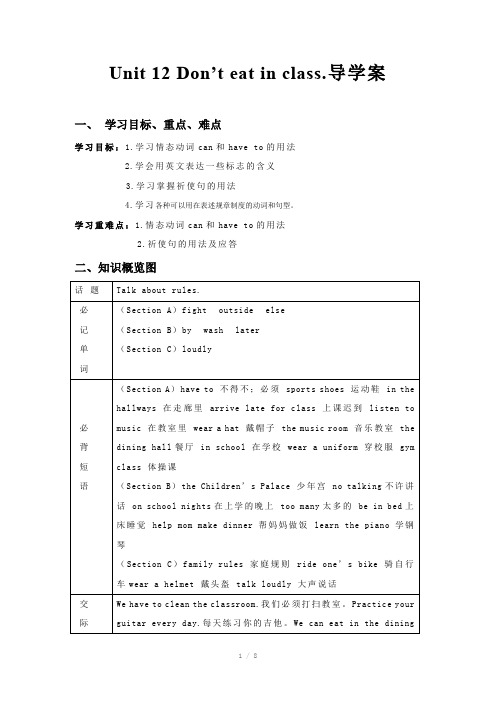
Unit 12 Don’t eat in class.导学案一、学习目标、重点、难点学习目标:1.学习情态动词can和have to的用法2.学会用英文表达一些标志的含义3.学习掌握祈使句的用法4.学习各种可以用在表述规章制度的动词和句型。
学习重难点:1.情态动词can和have to的用法2.祈使句的用法及应答二、知识概览图三、新课导引教师吃东西,问学生能否这样做,然后教师示范:Don’t eat in the classrooms.四、教材精华1. Don't arrive late for class.不要上课迟到。
(1)本句为祈使句的否定形式,表示“禁止做某事”,句型为“Don’t+动词原形+其他”。
Don’t eat in class.不要在课堂上吃东西。
(2)arrive late for…为固定短语,意为“……迟到”,相当于be late for…。
Don’t arrive late for the meeting.开会别迟到。
2. Can we listen to music, Cindy?辛迪,我们可以听音乐吗?本句是情态动词can的一般疑问句结构,can提前即可,用于询问是否可以做某事。
Can I watch TV? 我能看电视吗?【拓展】 can的一般疑问句的答语有两种,即肯定回答和否定回答。
—Can you wear hats in school?你们在学校可以戴帽子吗?—Yes, we can./No, we can’t.是的,可以戴。
/不,不能戴。
3. We can’t listen to music in the hallways, but we can listen to it outside.我们不可以在走廊里听音乐,但我们可以在外面听。
本句为情态动词can的否定句,其结构为:主语+can’t/can not +动词原形+其他。
We can’t talk in class.我们不能在课堂上说话。
人教版七年级下册英语Unit 12 教学设计
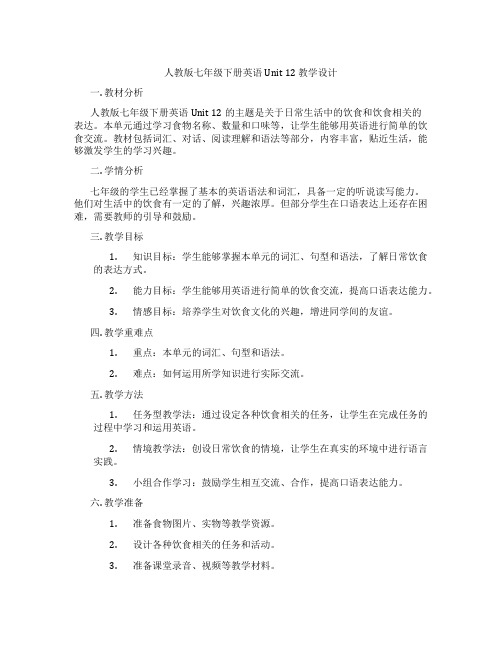
人教版七年级下册英语Unit 12 教学设计一. 教材分析人教版七年级下册英语Unit 12的主题是关于日常生活中的饮食和饮食相关的表达。
本单元通过学习食物名称、数量和口味等,让学生能够用英语进行简单的饮食交流。
教材包括词汇、对话、阅读理解和语法等部分,内容丰富,贴近生活,能够激发学生的学习兴趣。
二. 学情分析七年级的学生已经掌握了基本的英语语法和词汇,具备一定的听说读写能力。
他们对生活中的饮食有一定的了解,兴趣浓厚。
但部分学生在口语表达上还存在困难,需要教师的引导和鼓励。
三. 教学目标1.知识目标:学生能够掌握本单元的词汇、句型和语法,了解日常饮食的表达方式。
2.能力目标:学生能够用英语进行简单的饮食交流,提高口语表达能力。
3.情感目标:培养学生对饮食文化的兴趣,增进同学间的友谊。
四. 教学重难点1.重点:本单元的词汇、句型和语法。
2.难点:如何运用所学知识进行实际交流。
五. 教学方法1.任务型教学法:通过设定各种饮食相关的任务,让学生在完成任务的过程中学习和运用英语。
2.情境教学法:创设日常饮食的情境,让学生在真实的环境中进行语言实践。
3.小组合作学习:鼓励学生相互交流、合作,提高口语表达能力。
六. 教学准备1.准备食物图片、实物等教学资源。
2.设计各种饮食相关的任务和活动。
3.准备课堂录音、视频等教学材料。
七. 教学过程1.导入(5分钟)利用图片或实物展示各种食物,引导学生谈论他们喜欢吃的食物。
2.呈现(10分钟)介绍本课的主题,展示食物图片,引导学生用英语描述食物。
3.操练(15分钟)分组进行角色扮演,模拟餐厅点餐的场景,练习本课的句型和词汇。
4.巩固(10分钟)学生互相提问,用英语讨论喜欢的食物和口味。
教师给予指导和反馈。
5.拓展(10分钟)听录音或观看视频,了解不同地区的饮食习惯。
学生分享自己的饮食文化。
6.小结(5分钟)总结本节课所学内容,强调日常饮食的表达方式。
7.家庭作业(5分钟)布置作业:用英语写一篇关于自己喜欢的食物的短文。
人教版新目标七年级英语下册 Unit 12教学设计
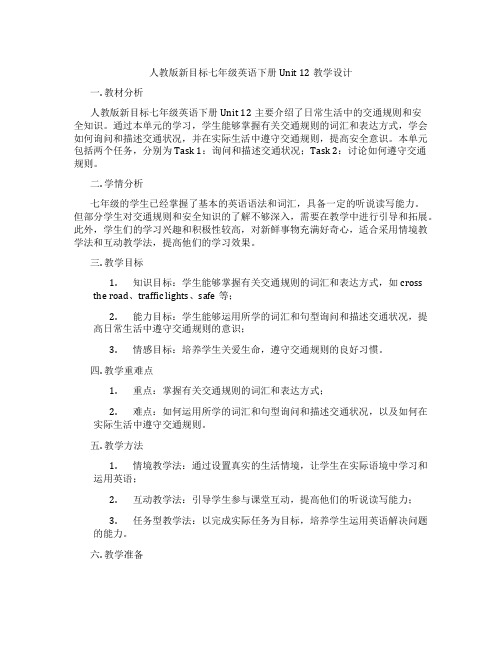
人教版新目标七年级英语下册 Unit 12教学设计一. 教材分析人教版新目标七年级英语下册Unit 12主要介绍了日常生活中的交通规则和安全知识。
通过本单元的学习,学生能够掌握有关交通规则的词汇和表达方式,学会如何询问和描述交通状况,并在实际生活中遵守交通规则,提高安全意识。
本单元包括两个任务,分别为Task 1:询问和描述交通状况;Task 2:讨论如何遵守交通规则。
二. 学情分析七年级的学生已经掌握了基本的英语语法和词汇,具备一定的听说读写能力。
但部分学生对交通规则和安全知识的了解不够深入,需要在教学中进行引导和拓展。
此外,学生们的学习兴趣和积极性较高,对新鲜事物充满好奇心,适合采用情境教学法和互动教学法,提高他们的学习效果。
三. 教学目标1.知识目标:学生能够掌握有关交通规则的词汇和表达方式,如crossthe road、traffic lights、safe等;2.能力目标:学生能够运用所学的词汇和句型询问和描述交通状况,提高日常生活中遵守交通规则的意识;3.情感目标:培养学生关爱生命,遵守交通规则的良好习惯。
四. 教学重难点1.重点:掌握有关交通规则的词汇和表达方式;2.难点:如何运用所学的词汇和句型询问和描述交通状况,以及如何在实际生活中遵守交通规则。
五. 教学方法1.情境教学法:通过设置真实的生活情境,让学生在实际语境中学习和运用英语;2.互动教学法:引导学生参与课堂互动,提高他们的听说读写能力;3.任务型教学法:以完成实际任务为目标,培养学生运用英语解决问题的能力。
六. 教学准备1.教学课件:制作包含图片、动画和视频的课件,帮助学生直观地了解交通规则;2.教学道具:准备一些交通标志和模型的实物或图片,用于课堂展示和练习;3.练习题:设计一些有关交通规则的练习题,用于巩固所学知识。
七. 教学过程1.导入(5分钟)利用课件展示一些交通场景,如红绿灯、行人过马路等,引导学生谈论交通规则。
七年级下英语Unit 12导学案
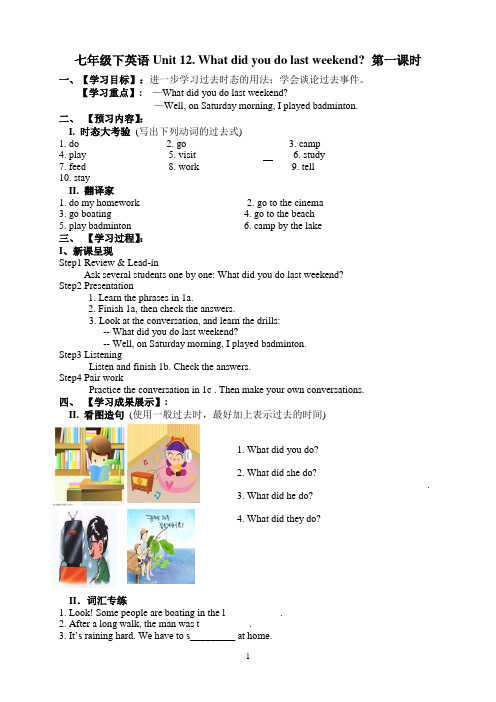
七年级下英语Unit 12. What did you do last weekend? 第一课时一、【学习目标】:进一步学习过去时态的用法;学会谈论过去事件。
【学习重点】: —What did you do last weekend?—Well, on Saturday morning, I played badminton.二、【预习内容】:I. 时态大考验(写出下列动词的过去式)1. do ____________2. go _______________3. camp _______________4. play ____________5. visit _____________6. study ______________7. feed _____________ 8. work _______________ 9. tell _______________10. stay ____________II. 翻译家1. do my homework _______________2. go to the cinema_______________3. go boating ___________________4. go to the beach_________________5. play badminton ________________6. camp by the lake________________三、【学习过程】:I、新课呈现Step1 Review & Lead-inAsk several students one by one: What did you do last weekend?Step2 Presentation1. Learn the phrases in 1a.2. Finish 1a, then check the answers.3. Look at the conversation, and learn the drills:-- What did you do last weekend?-- Well, on Saturday morning, I played badminton.Step3 ListeningListen and finish 1b. Check the answers.Step4 Pair workPractice the conversation in 1c . Then make your own conversations.四、【学习成果展示】:II. 看图造句(使用一般过去时,最好加上表示过去的时间)1. What did you do?_____________________________________________2. What did she do?____________________________________________.3. What did he do?_____________________________________________4. What did they do?_____________________________________________ II.词汇专练1. Look! Some people are boating in the l___________.2. After a long walk, the man was t__________.3. It’s raining hard. We have to s_________ at home.4. Every year a lot of _________ (visit) come to the West Lake.5.We all know cats like catching(捉)_________ (mouse).6. I ________ (study) for the math test one hour ago.7. My mother wasn’t at home yesterday. So I _______ (feed) the dog.III.单选( ) 1. There are seven ______ in the picture.A. sheepB. cowC. horseD. chicken( ) 2.―________ did you go yesterday?--- I went to the beach.A. WhereB. WhatC. WhenD. How( ) 3. Did she _________ to bed late last night?A. wentB. goC. goesD. going( ) 4. What ______ he do last weekend?A. doB. didC. doesD. was( ) 5. I _______ my grandma and we _________ some chickens.A. visit, feedB. visited, fedC. visited, feedD. visit, fedIV. 阅读Tony got up at eight o’clock and then had his breakfast. His mother cooked his favorite food---chicken noo dles for him. After breakfast, Tony began to do his homework. He didn’t have too much homework, because teachers wanted them to have a good rest during (期间) weekends.At thirty past nine, Tony read his favorite book Harry Potter(哈利波特). It was really a great book. After that, he listened to Jay’s songs. At eleven, he went to his friend Mike’s party at KFC. They were very happy because they ate their favorite food- hamburgers.Lunch was over at about one thirty in the afternoon. Then they all went to see a new movie.This was Tony’s Sunday. He really had a good time.( ) 1. What food did Tony like best?A. Milk and eggs.B. Egg noodles.C. Chicken noodles( ) 2. When did Tony read his favorite book?A. At 9:30 am.B. At 9:00 am.C. At 8:30 am.( ) 3. Tony and all his friends all liked _______ best.A. vegetablesB. fruitC. hamburgers( ) 4. What did Tony and his best friend do after lunch?A. They went to KFC.B. They listened to Jay’s songs.C. They watched a movie. ( ) 5. Which of the following is true?A. Tony had too much homework.B. Tony’s favorite book is Harry Potter.C. Tony went to Mike’s party at 9:00.七年级下英语Unit 12. What did you do last weekend? 第二课时一、【学习目标】:1. 重点单词:away, mouse, baby, shout, language2.重点句型:---Who did you play with? ---I played with my father.--- Where did you go? --- … I went to the beach with my parents.--- … that’s why it’s important to learn a second language …二、【预习内容】:1.观察Grammar Focus 的表格,思考一下几个问题:1)这些特殊疑问词分别表示什么意思?___________________________________________________________________.2)这些问句的过去时态一般要借助哪个动词?句子中的实义动词要用什么形式?____________________________________________________________________.3)这两个who问句为何一个需助动词,一个不需要助动词?_____________________________________________________________________三、【学习过程】:1.一般过去时的特殊疑问句:一般过去时的特殊疑问句由“疑问代词/ 疑问副词+ 一般疑问句”构成,具体可分为两种情况:(1)疑问词+ be (was/were) + 主语+ 其他?Where were your brothers just now? 刚才你的兄弟在哪?(2)疑问词+ did + 主语+ 其他?How did you get here? 你们怎么到这儿的?即学活用:根据答语或括号里的提示词写出问句1)Q:(you, vacation)________________________________________________________________________ A: I went to Qingdao.2)Q:(your parents, last weekend)________________________________________________________________________ A: They cleaned the house.3)Q:(the weather, yesterday)________________________________________________________________________ A: It was rainy.4)Q:_______________________________________________________________________ A: I went with my sister.5)Q:________________________________________________________________________ A:We went back three days ago.2.时态辨析:1)一般现在时:①表示现在的状态或主语具备的性格和能力。
(完整word版)新目标七年级下册Unit12Don’teatinclass.学案
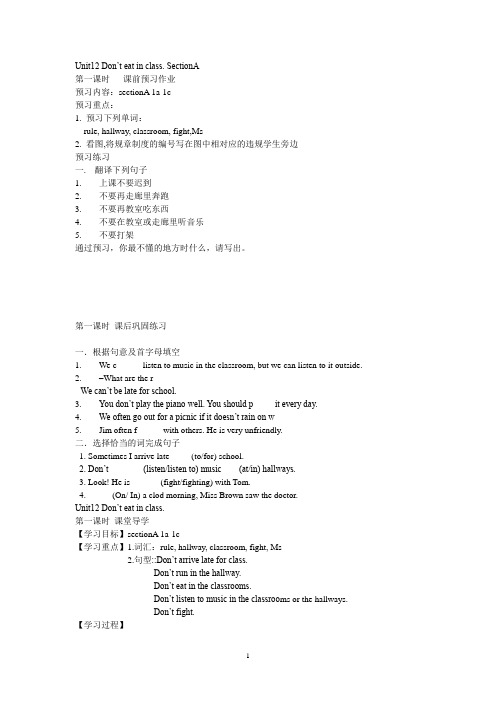
Unit12 Don’t eat in class. SectionA第一课时课前预习作业预习内容:sectionA 1a-1c预习重点:1. 预习下列单词:rule, hallway, classroom, fight,Ms2. 看图,将规章制度的编号写在图中相对应的违规学生旁边预习练习一. 翻译下列句子1. 上课不要迟到2. 不要再走廊里奔跑3. 不要再教室吃东西4. 不要在教室或走廊里听音乐5. 不要打架通过预习,你最不懂的地方时什么,请写出。
第一课时课后巩固练习一.根据句意及首字母填空1. We c listen to music in the classroom, but we can listen to it outside.2. –What are the r--We can’t be late for school.3. You don’t play the piano well. You should p it every day.4. We often go out for a picnic if it doesn’t rain on w5. Jim often f with others. He is very unfriendly.二.选择恰当的词完成句子1. Sometimes I arrive late (to/for) school.2. Don’t (listen/listen to) music (at/in) hallways.3. Look! He is (fight/fighting) with Tom.4. (On/ In) a clod morning, Miss Brown saw the doctor.Unit12 Don’t eat in class.第一课时课堂导学【学习目标】sectionA 1a-1c【学习重点】1.词汇:rule, hallway, classroom, fight, Ms2.句型::Don’t arrive late for class.Don’t run in the hallway.Don’t eat in the classrooms.Don’t listen to music in the classroo ms or the hallways.Don’t fight.【学习过程】一.值日报告二.旧知回顾Task1.小组展示预习作业三.新知呈现Task1.新课导入T: What’s your favorite subject? Do you like music?Now I’d like to enjoy a song with you. (play the tape)Do you like the song? What do you think of the song?Who is your favorite singer?Can you listen to music in the classroom?Can she/he listen to music in the hallways?Why can’t we listen to music in the classroom?S: It is our class rule. (T helps them to say it.)T: So please don’t listen to music in the classroom.Do you know the other class rules?S: Don’t eat in the classrooms.Don’t ……Task2.小组自主合作学习,练习下列句型A: What are the rules?B: Well, we can’t arrive late for class.……Task3.完成1aTask4.听录音,完成1b四.、疑难点拨1. arrive late for= be late for 做某事迟到。
人教版七年级下册英语Unit12导学案
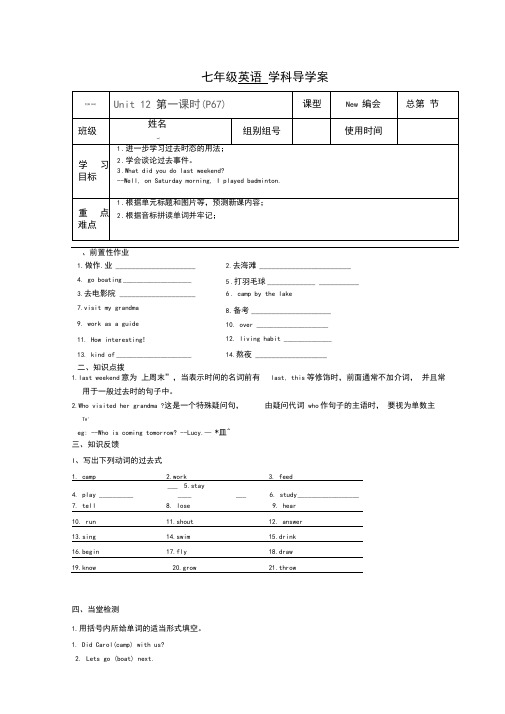
七年级英语 学科导学案、前置性作业st weekend 意为 上周末”,当表示时间的名词前有last, this 等修饰时,前面通常不加介词, 并且常用于一般过去时的句子中。
2.Who visited her grandma ?这是一个特殊疑问句,由疑问代词 who 作句子的主语时, 要视为单数主T H 'eg: --Who is coming tomorrow? --Lucy.— *皿^三、知识反馈I 、写出下列动词的过去式 1. camp2.work3. feed4. play __________ ___5.stay____ ___6. study __________________7. tell8. lose9. hear 10. run 11.shout 12. answer 13.sing 14.swim 15.drink 16.begin 17.fly 18.draw 19.know 20.grow21.throw四、当堂检测1.用括号内所给单词的适当形式填空。
1. Did Carol(camp) with us?2. Lets go (boat) next.1.做作.业 ____________________ 4. go boating ____________________ 3.去电影院 ___________________ 7.visit my grandma 9. work as a guide 11. How interesting!13. kind of ______________________二、知识点拨2.去海滩 _______________________ 5 .打羽毛球 ____________ __________ 6 . camp by the lake8.备考 ____________________ 10. over _____________________ 12. living habit ______________ 14.熬夜 __________________3.We like playing(beach) volleyball.4.They(play) badminton yesterday morning.5.I (not hear) from her last week.2.根据句意及首字母提示填空1.Don ' t c under the tree. It ' s not safe.2.The children like swimming in the l.3.The Super Dan is a great b player.4.Did you go to the b yesterday?5.I like -playing games o Sunday morning.3.单项选择( )1. -- Did you have a at school last week?-- Yes、we did. I got an A.A. testB. lookC. walk( )2. -- How long did Helen in Changsha? -- For a week.A. sitB. stayC. feel( )3. Lucy- go to the movies. She watched TV at home.A. isn'tB. didn'tC. wasn't( )3. He had to go「there.A. campB. campsC. Camping( )4. They are having fun the beach. A. on B. in C. atW根据汉语完成句子。
七下英语人教版Unit12学案
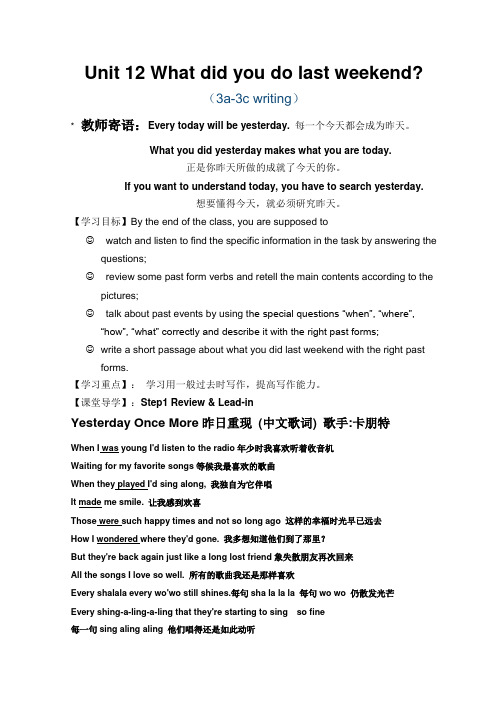
Unit 12 What did you do last weekend?(3a-3c writing)*教师寄语:Every today will be yesterday.每一个今天都会成为昨天。
What you did yesterday makes what you are today.正是你昨天所做的成就了今天的你。
If you want to understand today, you have to search yesterday.想要懂得今天,就必须研究昨天。
【学习目标】By the end of the class, you are supposed to☺watch and listen to find the specific information in the task by answering the questions;☺review some past form verbs and retell the main contents according to the pictures;☺talk about past events by using t he special questions “when”, “where”, “how”, “what” correctly and describe it with the right past forms;☺write a short passage about what you did last weekend with the right past forms.【学习重点】:学习用一般过去时写作,提高写作能力。
【课堂导学】:Step1 Review & Lead-inYesterday Once More昨日重现(中文歌词) 歌手:卡朋特When I was young I'd listen to the radio年少时我喜欢听着收音机Waiting for my favorite songs等候我最喜欢的歌曲When they played I'd sing along, 我独自为它伴唱It made me smile. 让我感到欢喜Those were such happy times and not so long ago 这样的幸福时光早已远去How I wondered where they'd gone. 我多想知道他们到了那里?But they're back again just like a long lost friend象失散朋友再次回来All the songs I love so well. 所有的歌曲我还是那样喜欢Every shalala every wo'wo still shines.每句sha la la la 每句wo wo 仍散发光芒Every shing-a-ling-a-ling that they're starting to sing so fine每一句sing aling aling 他们唱得还是如此动听。
七年级英语下册第12单元教学设计
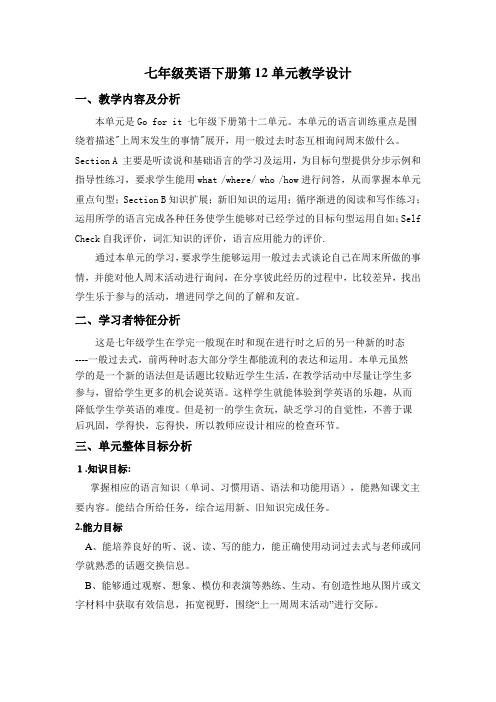
七年级英语下册第12单元教学设计一、教学内容及分析本单元是Go for it 七年级下册第十二单元。
本单元的语言训练重点是围绕着描述"上周末发生的事情"展开,用一般过去时态互相询问周末做什么。
Section A 主要是听读说和基础语言的学习及运用,为目标句型提供分步示例和指导性练习,要求学生能用what /where/ who /how进行问答,从而掌握本单元重点句型;Section B知识扩展;新旧知识的运用;循序渐进的阅读和写作练习;运用所学的语言完成各种任务使学生能够对已经学过的目标句型运用自如;Self Check自我评价,词汇知识的评价,语言应用能力的评价.通过本单元的学习,要求学生能够运用一般过去式谈论自己在周末所做的事情,并能对他人周末活动进行询问,在分享彼此经历的过程中,比较差异,找出学生乐于参与的活动,增进同学之间的了解和友谊。
二、学习者特征分析这是七年级学生在学完一般现在时和现在进行时之后的另一种新的时态----一般过去式,前两种时态大部分学生都能流利的表达和运用。
本单元虽然学的是一个新的语法但是话题比较贴近学生生活,在教学活动中尽量让学生多参与,留给学生更多的机会说英语。
这样学生就能体验到学英语的乐趣,从而降低学生学英语的难度。
但是初一的学生贪玩,缺乏学习的自觉性,不善于课后巩固,学得快,忘得快,所以教师应设计相应的检查环节。
三、单元整体目标分析1.知识目标:掌握相应的语言知识(单词、习惯用语、语法和功能用语),能熟知课文主要内容。
能结合所给任务,综合运用新、旧知识完成任务。
2.能力目标A、能培养良好的听、说、读、写的能力,能正确使用动词过去式与老师或同学就熟悉的话题交换信息。
B、能够通过观察、想象、模仿和表演等熟练、生动、有创造性地从图片或文字材料中获取有效信息,拓宽视野,围绕“上一周周末活动”进行交际。
C、能在日常生活中恰当理解这单元话题范围内的单词和习惯用语,在真实的语言环境中体会语言,运用语言,感受语言的真实价值,品味语言的实际意义,从而获得运用语言的实际能力,运用所学知识进行创造性地发挥应用和积极主动地用英语进行交流。
七年级英语下册_Unit_12_复习学案_人教新目标版
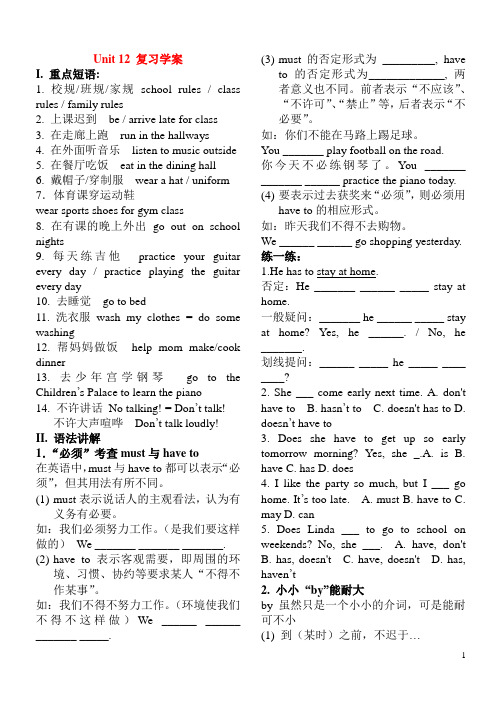
Unit 12 复习学案I. 重点短语:1. 校规/班规/家规school rules / class rules / family rules2. 上课迟到be / arrive late for class3. 在走廊上跑run in the hallways4. 在外面听音乐listen to music outside5. 在餐厅吃饭eat in the dining hall6. 戴帽子/穿制服wear a hat / uniform 7.体育课穿运动鞋wear sports shoes for gym class8. 在有课的晚上外出go out on school nights9. 每天练吉他practice your guitar every day / practice playing the guitar every day10. 去睡觉go to bed11. 洗衣服wash my clothes = do some washing12. 帮妈妈做饭help mom make/cook dinner13. 去少年宫学钢琴go to the Children’s Palace to learn the piano14. 不许讲话No talking! = Don’t talk!不许大声喧哗Don’t talk loudly! II. 语法讲解1.“必须”考查must与have to在英语中,must与have to都可以表示“必须”,但其用法有所不同。
(1)must表示说话人的主观看法,认为有义务有必要。
如:我们必须努力工作。
(是我们要这样做的)We _______ _______ _______. (2)have to 表示客观需要,即周围的环境、习惯、协约等要求某人“不得不作某事”。
如:我们不得不努力工作。
(环境使我们不得不这样做)We ______ ______ _______ _____. (3)must的否定形式为_________, haveto的否定形式为_____________, 两者意义也不同。
- 1、下载文档前请自行甄别文档内容的完整性,平台不提供额外的编辑、内容补充、找答案等附加服务。
- 2、"仅部分预览"的文档,不可在线预览部分如存在完整性等问题,可反馈申请退款(可完整预览的文档不适用该条件!)。
- 3、如文档侵犯您的权益,请联系客服反馈,我们会尽快为您处理(人工客服工作时间:9:00-18:30)。
Unit 12 What did you do last weekend?Period One (Section A 1a-1c)班级姓名【学习目标】:1、掌握本课新单词、句型。
2、掌握重点句型:—What did you do last weekend?—Well, on Saturday morning, I played badminton.3.巩固一般过去时态的各种句式,重点掌握其特殊疑问句句式。
【学习重点】:巩固一般过去时态的各种句式,重点掌握其特殊疑问句句式。
【学习过程】:一、自主学习预习任务一: 1、认读并讨论本课的新单词。
(C类展示)扎营__________湖_________海滩_________羽毛球运动___________去划船_______________________去海滩_____________________在湖边_______________________打羽毛球____________________上个周末你干了什么?_____________________________________星期六上午,我打了羽毛球。
_______________________________2、检验预习效果。
预习任务二: 1a的任务很简单,将活动与图片迅速搭配好。
(C类展示)二、合作探究1. 听录音,完成1b,在每一幅图片下面写上日子、早上、下午或晚上。
再听一遍,能完成下面的听力突破:(B类展示)Bob: Hey, Lucy.Lucy: Hi, Bob.Bob: How was your_______________?Lucy: It was great.Bob: So, what did you do?Lucy:Well, on Saturday morning, I played ___________. In the afternoon, I wentto the___________, and at night, I went to the cinema.Bob: Cool. What about Sunday?Lucy:In the morning, I_____________by the _______with my classmates. In the afternoon, we went__________, and at night, I did my homework.2. 通过再次朗读听力对话,我们知道这节课的语言目标就是谈论过去的事情,巩固一般过去时!(A类展示)3. Pairwork.分角色表演!你是学生Lucy,!(小组展示)B: What did you do last weekend, Lucy?A: Well, on Saturday morning, I played badminton.In the afternoon, I went to the beach, and at night, I went to the cinema.B: Cool. What about Sunday?A: In the morning, I camped by the lake with my classmates. In the afternoon, we went boating, and at night, I did my homework.三、巩固提升1).按要求完成短语。
去划船_______________________去海滩_____________________在湖边_______________________打羽毛球____________________星期五上午___________________上个周末_____________________你上个周末过得怎样?好极了。
_________________________________________________________你上周六干了什么?我去了海滩。
___________________________________________________________2).句型转换。
1. I was at home last night.(改为一般疑问句)________ _______ at home last night?2.I played badminton yesterday.(改为否定句)I _______ ________badminton yesterday.3. Vera visited The Great Wall last Sunday.(改为一般疑问句)________ Vera ________ the Great Wall last Sunday?4.She went to London on vacation.(就划线部分提问)_________ did you ________ on vacation?5.He went to the movies last week. (就划线部分提问)________ _________he ________ last week?6.He goes to the cinema every Sunday evening.(用last night 改写)He _________to the cinema last night.Unit 12 What did you do last weekend?Period Two (Section A 2a-2d)班级姓名【学习目标】:1.掌握本课生词和短语:2. 掌握重点句型:【学习重点】:巩固一般过去时。
【学习过程】:一、自主学习1.个人自读,记忆本课单词。
2.小组互相检查单词阅读情况3 . 写出下列单词,并熟读。
(C类展示)绵羊(pl.___________)作为疲倦的___________自然的蝴蝶游客______________停留呆在家里_______________熬夜___________________学习备考作为…工作二.合作探究A:读2d对话翻译下列重点句子。
(B类展示)(1) I worked as a guide at the Natural History Museum._______________________________________________________(2) How interesting!______________________________________(3) They have a butterfly house with over 200 kinds of butterflies!________________________________________________________(4) I told the visitors about them and their living habits.________________________________________________________(5) I stayed up late to watch the soccer game.______________________B:快速浏览2a、2b的听力任务,做好听力准备并能准确完成书上的听力任务。
再听一遍,能轻松补全下面的对话。
(A类展示)Teacher: So, did everyone have a good weekend?Students: Yeah, we did, Ms. Clark!Teacher: Good. What did you do last weekend, Becky?Becky: I __________ my grandma, and I _________ my homework.Teacher: Great! And how about you, Carol? Did you go out?Carol: No, I ____________ at home. I studied for the English_________. Teacher: Wow, good for you. Jack, how about you? Where did you go?Jack: I went to a farm, and I fed some cows.Teacher: Sounds like you _____________.C;.就2d的学习,让我们来探讨“How interesting!”这个重点句子吧!(A类展示)通过小组热烈探讨和各抒己见,我们知道了这是个_____________,结构为三、巩固提升A.用所给单词的适当形式填空1.There are some______________(sheep)on the mountain.2.I_____________(study)for my English test last night.3.Mary___________(feed)her chickens just now.4.There are all kinds of______________ (butterfly)in the butterfly house.5.Quite a lot of______________(visit)come to China every year.B.根据首字母和句意完成单词1.Tom is going to work as a g______________in Zhangjiajie.2.I’m very t___________now. I only want to have a good rest.3.Don’t s___________up late. It’s bad for your health.4.There are many people on the b______________here in summer.5.Do you want to visit the N____________History Museum?C.巧填介词1.—What did you do last night?— I studied________the math test.2.His uncle works_________a waiter in a restaurant.3.I want to have a big house___________a beautiful garden.4.I told my friend___________the good news.5.They cleaned the classroom________Monday afternoon.Unit 12 What did you do last weekend?Period Three (Section A Grammar Focus-3c)班级姓名【学习目标】:1.掌握下列生词和短语:New words: away, mouse, baby, shout, woof, languageKey phrases: run away, shout at…,a family of mice2.掌握重点句型:(1)A family of mice were in the kitchen on Saturday morning when they saw a big cat.(2) Father Mouse shouted at the cat,“Woof, woof!”(3)The cat quickly ran away.(4) That’s why it’s important to learn a second language.【学习重点】:一般过去时态的特殊疑问句句式。
